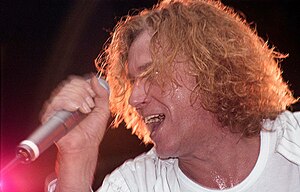Paul Young (17 June 1947 – 15 July 2000) was a British singer and songwriter. He achieved success in the bands Sad Café and Mike + the Mechanics.
Paul Young | |
|---|---|
 Young performing with Mike and the Mechanics in 1994. | |
| Background information | |
| Born | 17 June 1947 Benchill, Manchester, England |
| Died | 15 July 2000 (aged 53) Hale, Altrincham, England |
| Genres | Pop rock, soft rock |
| Occupations |
|
| Years active | 1964–2000 |
| Formerly of | Mike + the Mechanics, Sad Café |
Life and career
editYoung was born on 17 June 1947 in the Wythenshawe district[1] of Manchester, England.[2]
Young was a member of The Toggery Five in the 1960s. The Manchester-based band signed a recording contract, played in Germany, and released the single "I'm Gonna Jump".[3]
After The Toggery Five disbanded, Young became the lead singer of the band Gyro in the mid-1970s. Young and Gyro bandmate Ian Wilson, together with members of Mandalaband, formed the band Sad Café in 1976. Sad Café signed with RCA Records in the U.K.[3] The band's single, "Every Day Hurts" (1979), was a no. 3 hit on the British charts.[4] The band also hit the UK Top 40 with "Strange Little Girl", "My Oh My" and "I'm in Love Again",[5] and had two US Billboard Hot 100 hits with "Run Home Girl" and "La-Di-Da".[6]
Young enjoyed further chart success sharing lead vocal duties with Paul Carrack in Mike + The Mechanics, the pop-rock band formed in 1985 by Genesis guitarist Mike Rutherford.[citation needed] He was brought into Mike + the Mechanics on the recommendation of producer/songwriter Christopher Neil and Neil's manager.[7] Mike + the Mechanics scored three Top 40 hits, including two US Top 10s, "Silent Running (On Dangerous Ground)" and "All I Need Is a Miracle".[8] The single "The Living Years" (US#1, UK#2) became the band's biggest hit, and featured on the band's second album Living Years.[citation needed]
During Young's career, he provided lead vocals on several chart hits, including Sad Café's "Every Day Hurts" and "My Oh My", and Mike + The Mechanics' "All I Need Is a Miracle", "Word of Mouth", "Taken In" and "Nobody's Perfect".[7]
Young possessed a wide vocal range, often utilising fifth octave head voice notes, and a voice characterised as "rich".[9] His early style has been likened to that of Mick Jagger;[10] in the early 1980s, he began to explore a more "emotive" style.[11]
On 15 July 2000, having no symptoms, Young had a sudden heart attack at around 6:30pm at his home in Hale, Altrincham, and died shortly afterwards at 53 years old. An autopsy revealed that the cause of death was a heart attack and that "it was not the first".[12]
Legacy
editMike Rutherford said of Young, "He had a fantastic voice, one of the best rock voices of his generation ... a complete natural."[2]
Former Marillion vocalist and 1980s chart peer Fish described him as "one of the finest frontmen and singers from the history of the British music scene", who exhibited "immense personality, glowing charisma and outrageous positivism".[12]
Discography
editThis section needs additional citations for verification. (December 2020) |
The Young Brothers
- 1968 "I've Always Wanted Love"/"Mirror, Mirror" (single)
Young & Renshaw
- 1971 "This Is Young & Renshaw" (album)
Paul Young
- 1974 "I Can't Live Without You" (single)
- 2011 Chronicles (album)
- 2011 "Your Shoes" (single)
References
edit- ^ "Saturday, 15 July 2000: Paul Young". The Encyclopedia of Dead Rock Stars: Heroin, Handguns, and Ham Sandwiches. London, UK: Penguin Group. 2008. p. 432. ISBN 9781556527548. Retrieved 15 May 2016 – via Google Books.
- ^ a b Tortorici, Frank (18 July 2000). "Mike + the Mechanics' Paul Young Dies". MTV. Archived from the original on 16 August 2022. Retrieved 15 May 2016.
- ^ a b Laing, Dave (19 July 2000). "Obituary: Paul Young". The Guardian. Retrieved 16 August 2022.
- ^ "SAD CAFE | full Official Chart History | Official Charts Company". www.officialcharts.com.
- ^ Roberts, David (2006). British Hit Singles & Albums (19th ed.). London: Guinness World Records Limited. p. 478. ISBN 1-904994-10-5.
- ^ Colin Larkin, ed. (1997). The Virgin Encyclopedia of Popular Music (Concise ed.). Virgin Books. p. 1051. ISBN 1-85227-745-9.
- ^ a b Neer, Dan (1985). Mike on Mike [interview LP], Atlantic Recording Corporation.
- ^ "Mike + The Mechanics Album & Song Chart History – Billboard 200". Billboard. Retrieved 11 December 2010.
- ^ Orens, Geoff. The Living Years review. AllMusic. Retrieved 17 May 2013.
- ^ Boldman, Gina. Misplaced Ideals review. AllMusic. Retrieved 17 May 2013.
- ^ DeGagne, Mike. Mike + The Mechanics review. AllMusic. Retrieved 17 May 2013.
- ^ a b ""Everyday Hurts" Paul Young 1947–2000". The official Fish website. 19 July 2000. Archived from the original on 10 November 2013. Retrieved 3 June 2012.
External links
edit- BBC news, report on his death